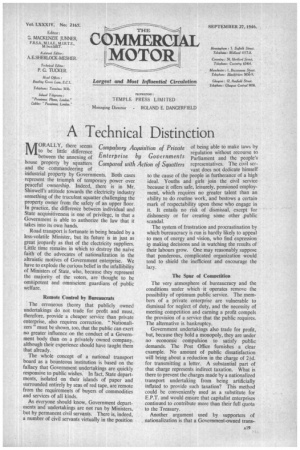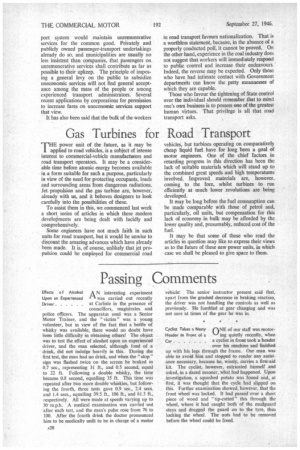A Technical Distinction
Page 21

Page 22

If you've noticed an error in this article please click here to report it so we can fix it.
MORALLY, there seems to be little difference between the annexing of house property by squatters and the commandeering of industrial property by Governments. Both cases represent the triumph of temporary power over peaceful ownership. Indeed, there is in Mr. Shinwell's attitude towards the electricity industry something of the truculent squatter challenging the property owner from the safety of an upper floor. In practice, the difference between individual and State acquisitiveness is one of privilege, in that a Government is able to authorize the law that it takes into its own hands.
Road transport is fortunate in being headed by a less-volatile Minister, but its future• is in just as great jeopardy as that of the electricity suppliers. Little time remains in which to destroy the naive faith of the advocates of nationalization in the altruistic motives of Government enterprise. We have to explode the curious belief in the infallibility of Ministers of State, who because they represent the majority of the voters, are thought to be omnipotent and omniscient guardians of public welfare.
Remote Control by Bureaucrats The erroneous theory that publicly owned undertakings do not trade for profit and must, therefore, provide a cheaper service than private enterprise, also requires correction. " Nationalizers "must be shown, too, that the public can exert no greater influence on the conduct of a Government body than on a privately owned company, although their experience should have taught them that already.
The whole concept of a national transport board as a bounteous institution is based on the fallacy that Government undertakings are quickly responsive to public wishes. In fact, State departments, isolated on their islands of paper and surrounded entirely by seas of red tape, are remote from the requirements of buyers of commodities and services of all kinds.
As everyone should know, Government departments and undertakings are not run by Ministers, but by permanent civil servants. There is, indeed, a number of civil servants virtually in the position of being able to make laws by regulation without recourse to Parliament and the people's representatives. The civil servant does not dedicate himself to the cause of the people in furtherance of a high ideal. Youths and girls join the civil service because it offers safe, leisurely, pensioned employment, which requires no greater talent than an ability to do routine work, and bestows a certain mark of respectability upon those who engage in it. It entails no risk of dismissal, except for dishonesty or for creating some other public scandal.
The system of frustration and procrastination by which bureaucracy is run is hardly likely to appeal to men of energy and vision, who find expression iv making decisions and in watching the results of their labours grow. One may reasonably suppose that ponderous, complicated organization would tend to shield the inefficient and encourage the lazy.
The Spur of Competition The very atmosphere of bureaucracy and the conditions under which it operates remove the possibility of optimum public service. The members of a private enterprise are vulnerable to dismissal for neglect of duty, and the necessity of meeting competition and earning a profit compels the provision of a service that the public requires. The alternative is bankruptcy.
Government undertakings also trade for profit, but, because they hold a monopoly, they are under no economic compulsion to satisfy public demands. The Post Office furnishes a clear example. No amount of public dissatisfaction will bring about a reduction in the charge of 2.1d. for transmitting a letter. A substantial part of that charge represents indirect taxation. What is there to prevent the charges made by a nationalized transport undertaking from being artificially inflated to provide such taxation? This method could be conveniently used as a substitute for E.P.T. and would ensure that capitalist enterprises continued to contribute more than their full quota to the Treasury.
Another argument used by supporters of nationalization is that a Government-owned trans port system would maintain unremunerative services for the common good. Privately and publicly owned passenger-transport undertakings already do so, and municipalities are usually no less insistent than companies, that passengers on unremunerative services shall contribute as far as possible to their upkeep. The principle of imposing a general levy on the public to subsidize uneconomic services will not find general acceptance among the mass of the people or among experienced transport administrators. Several recent applications by corporations for permission to increase fares on uneconomic services support that view.
It has also been said that the bulk of the workers in road transport favours nationalization. That is a worthless statement, because, in the absence of a properly conducted poll, it cannot be proved. On the other hand, experience in the coal industry does not suggest that workers will immediately respond to public control and increase their endeavours. Indeed, the reverse may be expected. Only those who have had intimate contact with Government departments can know the petty meannesses of which they are capable. Those who favour the tightening of State control over the individual should remember that to mind one's own business is to possess one of the greatest human virtues. That privilege is all that road transport asks.




































































